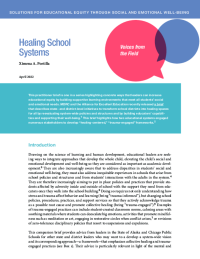Healing School Systems: Voices from the Field

 School systems throughout the United States need collective healing. The COVID-19 pandemic sent a shock through the nation resulting in many families experiencing job loss, food insecurity, increased financial and emotional stress, and mental health issues for the first time, while exacerbating such issues for many other families who already experienced them. And as schools reopened after extended closures, teachers reported being more stressed than before the pandemic, highlighting the cumulative effects of a year of remote and hybrid instruction, COVID-19 variants upending in-person instruction, the need to address students’ unfinished learning while also attending to their social and emotional needs, and severe staffing shortages burdening an already taxed workforce.
School systems throughout the United States need collective healing. The COVID-19 pandemic sent a shock through the nation resulting in many families experiencing job loss, food insecurity, increased financial and emotional stress, and mental health issues for the first time, while exacerbating such issues for many other families who already experienced them. And as schools reopened after extended closures, teachers reported being more stressed than before the pandemic, highlighting the cumulative effects of a year of remote and hybrid instruction, COVID-19 variants upending in-person instruction, the need to address students’ unfinished learning while also attending to their social and emotional needs, and severe staffing shortages burdening an already taxed workforce.
An accompanying brief highlights the experiences of three educational systems that are striving to address the adversity that affects their school communities. They are shifting away from reactive, student-level interventions and exclusion in response to challenging student behavior, and toward whole-system approaches focused on healing and prevention and cultivating psychologically safe and supportive environments for all. This companion brief provides advice from leaders in the State of Alaska and Chicago Public Schools for other state and district leaders who may want to a develop a system-wide vision and its corresponding approach—a framework—that emphasizes such practices. Their advice is particularly relevant in light of the mental and behavioral health challenges districts are currently facing during the COVID-19 pandemic. The featured lessons explain why they created system-wide frameworks to guide this work, how they engaged diverse stakeholders within their systems to develop the frameworks, and how they involved the community to shape them.
Developing a system-wide framework
- A state perspective
- A district perspective
Engaging diverse stakeholders
- Creating a working group
- Integrating the framework into the existing vision of the school system
- Making the framework relevant for the adults in the system
- Recognizing that staff members need multiple ways to engage with the framework
- Tracking stakeholder engagement
Giving voice to the community
- Incorporating community perspectives
- Identifying community needs and building trust
- Community-wide collaboration to promote sustainability






